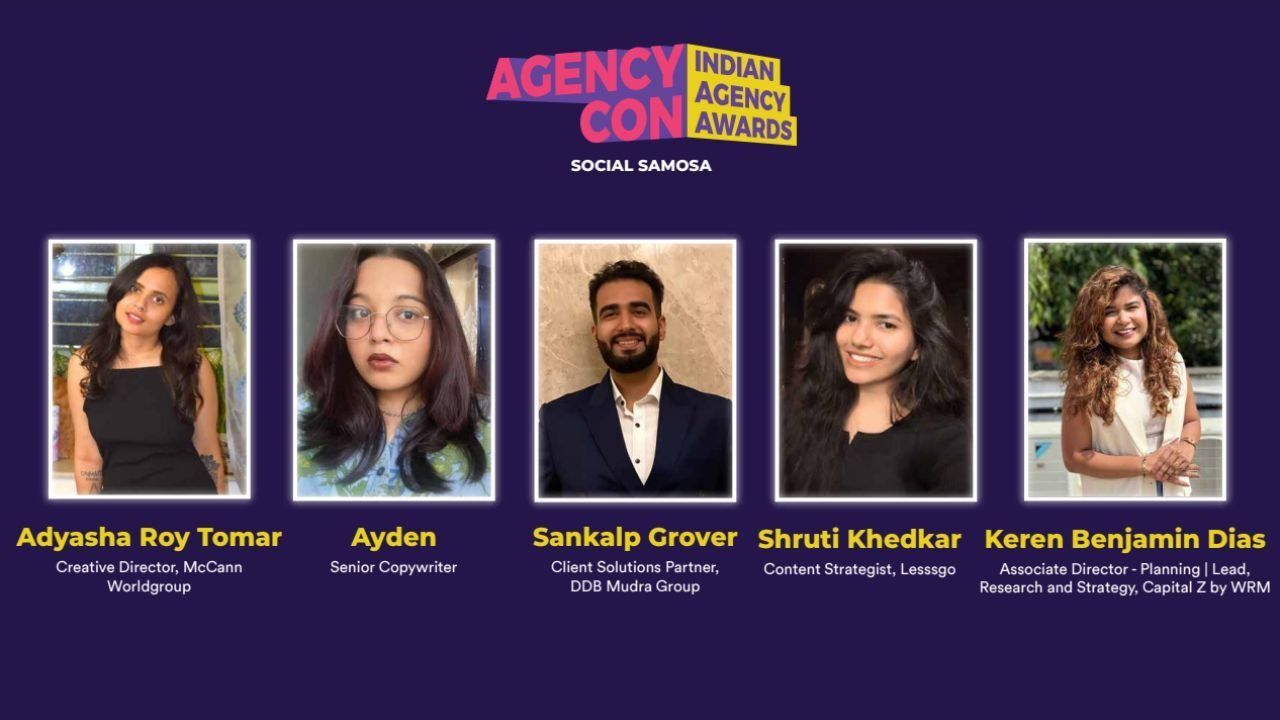What do GenZ and millennials expect from agency culture

As the workforce evolves, so do its expectations, and nowhere is that more visible than within agency culture. This generational face-off brings together Gen Z and Millennial voices to unpack what they truly want from the places they work. Is it flexibility, purpose, perks, or psychological safety? While Millennials shaped the early demand for work-life balance and value-driven leadership, Gen Z is entering the scene with even bolder expectations. From hybrid models to hustle culture, feedback loops to mental health support, this debate dives into the tensions, overlaps, and stark differences between the two generations. Expect some heat, a few truths, and hopefully, common ground.
The Panel
Session Chair: Sneha Medda, Correspondent, Social Samosa and Tirtha Vedak, AVP - Client Solutions & Events, Social Samosa
As the industry faces a turning point, this panel of agency professionals at AgencyCon 2025 explored how generational expectations are shaping, and clashing within, modern agency culture. With honesty, empathy and humour, they unpacked what Gen Z wants, what millennials have carried, and the path toward a more balanced, future-ready workplace.
For many millennials, the agency life once symbolised rebellion, an escape from rigid paths and a place where creativity came before convention. Keren Benjamin Dias recalled that era as one fuelled by people who didn’t fit into the doctor-engineer mould. “We joined advertising as a form of rebellion,” she said. “But now, Gen Z enters already as creators, with visibility, voice, and the need for platforms that respect both.”
This generational contrast underscored the discussion. While Gen Z is vocal about their boundaries, identity, and mental health, millennials carry the emotional labour of transition. “As millennials, we’ve fought many battles already,” said Adyasha Roy Tomar. “We’re the bridge between Gen X/Boomer managers and the Gen Z workforce and we’re doing our best to hold that middle ground. We’re also learning from Gen Z, setting boundaries, speaking up, and, for many of us, finally learning to say no. The shift is real, and we’re all shaping this new culture together.”
Sankalp Grover reinforced that the generational divide is not as homogenous as it’s often portrayed. “When people talk about Gen Z, they generalise. But a lot of Gen Z don’t even feel like they’re Gen Z. There’s so much individuality,” he said. According to him, younger talent values agility and outcomes over clocked hours. “Hustle has changed. It’s not just work, it’s personal too. Starting something on the side, joining a run club—that’s hustle now.”
The need to be seen, credited, and emotionally secure came up again and again. “The non-negotiable is the feeling of being seen and valued,” said Shruti Khedkar. “My teammates hype me when certain content goes out. The appreciation is real, and credit is loud.” She made it clear: Gen Z doesn’t want to be babied—but they do want clarity and acknowledgment.
For Ayden, safety in the workplace starts with being able to show up without having to explain or defend your identity. “If someone misgenders me, I will think about it all the time,” they shared. “Safety is when I don’t have to think about my identity. And I credit the people who came before me for helping create that space.” They also noted that despite assumptions, younger talent isn’t immune to pressure or burnout. “Some of us want to stay till 9 pm because we’ve seen you do it, and we think it’s aspirational. But we’re burnt out too, even if people don’t take us seriously.”
At several points, the discussion shifted from expectation to mutual respect. “It’s a two-way street,” said Sankalp. “Even good managers can sometimes make work feel a little hectic. It’s all about balance and understanding on both sides.”
Keren acknowledged that Gen Z has also shifted how loyalty is defined. “It’s no longer about tenure. Loyalty now is a two-way street, it’s about being seen, heard, and given room to make mistakes.” She added that younger professionals have taught her how to confront, give feedback to leadership, and reshape that relationship from the bottom up.
The emotional burden of unlearning also came up, especially around burnout. Adyasha reflected on how late nights, dark circles, and sacrificing health had once been worn like badges of honour. “That culture left us with real consequences,” she said. “We joke about millennials dying early, but it’s not funny, we didn’t value ourselves enough. That’s something we’ve had to unlearn.”
Ayden, reflecting on what they’ve picked up from older colleagues, said: “What I’ve learned from millennials is that it’s okay to get it wrong the first time. We often fear rejection, but they’ve shown us that it takes many wrongs to get it right, and that’s part of the process.”
Shruti summed it up playfully, “Panic is okay, just panic with a plan.”
There were also lessons about self-worth. “Asking for what I’m worth used to terrify me,” said Adyasha. “But Gen Z taught me that money, not titles or designations, is what pays your bills. That lesson matters.”
Ayden underlined another pressing ask from Gen Z: access. “Most of us have been working for a few years now, and what we need is exposure. If we’re not part of brainstorms with CCOs, if we don’t have access to senior leadership, how will we ever become the next Piyush Pandey?”
To close, Sankalp pointed to a simple truth that still holds weight, “We don’t need micromanagement. Just some mentorship. Sometimes our seniors are like our elder siblings.”
What emerged was a collective plea, not just for better policies, but for deeper understanding. For agency culture to truly evolve, the conversation has to move from generational differences to generational dialogue.
News